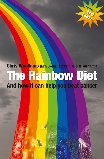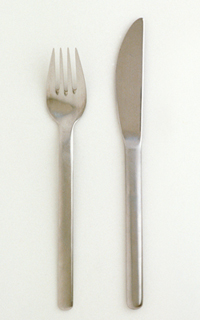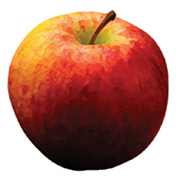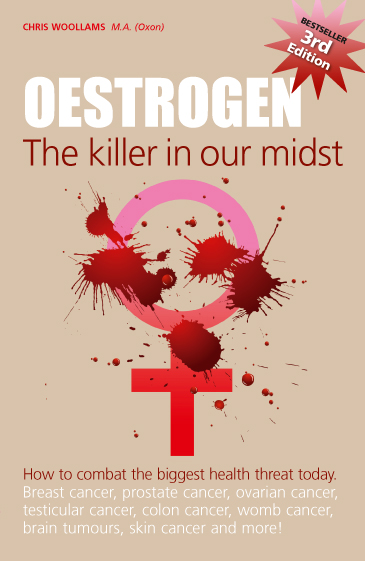This is the first pillar in the CANCERactive series, the 4 pillars of cancer, looking at the causes and drivers of cancer. Pillar 1 examines the ideal diet to beat cancer. We are adamant that there is only one: The colourful Rainbow Diet.
A poor diet causes cancer to grow; a good diet stops it.

The World Health Organisation is quite clear: a poor diet causes cancer. And a good diet prevents cancer. As we will see below, there is clear research from Americas National Cancer Institute that, if you have cancer and you are in remission, a poor diet encourages the cancer to grow back, a good diet prevents this. Thus a good diet is not just part of cancer prevention, it is part of cancer treatment.
So what are the fundamentals of a Diet to beat cancer? Here are some tips:
A diet to beat cancer:
1. Consume no added sugar (common glucose) - no fizzy soft drinks, no refined carbohydrates, no sweet puddings, no bought ready-made smoothies and fruit juices, no ice cream, chocolate cake, biscuits or refined honey.
2. Consume only limited amounts of whole carbs - like whole rolled oats or whole organic brown rice, or a small jacket potato.
3. Consume good quantities of healthy oils and fats - extra virgin olive oil, nuts (like walnuts, almonds), seeds (like flaxseed, pumpkin, sunflower and sesame seed), avocados and oily fish.
4. Consume animal protein and saturated fat in moderation. Restrict cows dairy and saturated fat consumption, especially in your teens.
5. Consume alcohol in moderation. Red wine is a good alcohol.
6. Consume large amounts of a diverse range of colourful vegetables, along with a few fruits. Preferably all in season.
7. Avoid trans fats and added salt.
8. Eat probiotic foods - cloudy apple cider vinegar, sourdough bread, kefir, sauerkraut and even a little raw, unpasteurised milk, for example as cheese.
If that sounds remarkably like the colourful Mediterranean Diet, it is no coincidence. We call it the Rainbow Diet - and you can read all about its ability to PROTECT and CORRECT you from cancer in our book and recipe book.
Go To:the new Rainbow Diet Website where we have included all the excellent cancer prevention and correction research
Misleading comments on diet
We've been through 35 years of Western Governments talking rubbish about low-fat and high carb diets. This has lead to an obesity epidemic in the West, along with increased levels of chronic illnesses like heart disease and cancer. This awful diet causes chronic inflammation - yet there are still UK cancer charities like MacMillan Cancer Support and Cancer Research UK that will not acknowledge the very evident and increasing research and warn people of the links between cows dairy or glucose and insulin and their links to inflammation and cancer.
And theres a new dimension. If your microbiome (the beneficial bacteria in your gut) is not in a healthy state you won't be able to make all the healthy vitamins, minerals and natural compounds you need to be healthy. You see, your gut bacteria don't release these compounds from your food - they actually make them. But your doctor (who doesn't want you to take supplements but instead eat 5 lots of fruit and vegetables a day) is busy killing the good bacteria in your gut with his drugs and antibiotics.
One recent fact to emerge in an American study - people who consumed the highest levels of fibre had the strongest immune systems. The explanation? Your good bacteria love soluble fibre and so will grow and multiply. And 85% of your immune system is built in response to the bacteria in your gut. Feed your bacteria junk, or antibiotics and drugs, and you will have a very poor immune system.
Fundamental Truths on diet and cancer
Any diet to beat cancer should acknowledge the following:
1. In 2012 The American Cancer Society produced a report that has since been endorsed by the top cancer body in America The National Cancer Institute. It said that since 2006 there had been anexplosion into research into complementary therapies and that there is now overwhelming evidence that diet, weight control and exercise can increase survival and even prevent a cancer returning.
2. In Cancer Watch, our research centre, and elsewhere on this website we have covered various aspects of diet for cancer for example:
a.The NCI conducted research into cancer stem cells at the heart of tumours. While a bad diet encourages a cancer to re-grow after chemotherapy treatment (at the moment no chemotherapy is known that can kill them), a good diet can stop that regrowth. (The researchers suggested certain natural compounds that can be taken as supplements . Many of these compounds (like suphoraphanes, resveratrol, curcumin, piperine, vitamin E - the one with all 8 natural components - vitamin A, genistein, choline, theanine, EGCG in green tea and more) are covered in our book The Rainbow Diet - and how it can help you beat cancer

b.There is now mounting evidence that high plasma glucose levels are linked to the development of cancer and lowered survival rates. Fasting and cancer, The Ketogenic Diet (in conjunction with Hyperbaric Oxygen) and Calorie Restriction have shown great promise in research both with and without conventional treatments of radiotherapy and chemotherapy for killing cancer cells and improving survival..
3. The Ideal Diet - in a 15-year study, those women who adhered most closely to the colourful Mediterranean diet had no cancer nor any of 10 other chronic illnesses at the end of the study. There are separate studies on breast cancer, colorectal cancer and prostate cancer survival too.
4. Exercise plays an important role. There are meta-studies showing that light, daily exercise is linked to greater survival rates. This exercise does not have to be strenuous it can include Tai Chi, yoga and brisk walking, for example. The important point is that 30 minutes every day is linked to improved survival.
5. Weight control: People who are overweight and/or obese develop more cancers and survive least. But the good news is that research by NorthWestern Medical School showed that if you controlled your weight loss back to normal levels, your survival times increased. They also showed that if you put on weight when you had cancer, your survival times shortened.
The MD Anderson Cancer Centre andJohn Boik
And heres the rub. Theres a chap called John Boik. He was at the top of the prestigious MD Anderson Cancer Centre in Texas and in 2001 he published a book called, Natural Compounds in Cancer Therapy. Its over an inch thick and contains 4000 scientific references. Every doctor should be made to read it during their seven years at medical school because, if nothing else, it will show them and prove to them that diet is crucial in the prevention and treatment of cancer.
His belief is that cancer is a multi-step process. He sites 20 steps, for exampleirritation, inflammation, pre-cancer cells, cancer cells, growth and growth hormone, a tumour, the need for blood supply, firing off cells round the body etc. etc. And he assigns natural compounds from foods and vitamins and minerals shown in research to fight each step.
Nowhere near as comprehensive, but an awful lot easier to read, is my own The Rainbow Diet - and how it can help you beat cancer,which looks at the foods you must add into your diet. Foods, by and large, that we just dont eat anymore. Foods that have a proven, well-researched, anti-cancer effect. Like fish oils with their long chain omega 3 and vitamin D, or garlic (known to reduce the formation of blood supply vessels to tumours), curcumin, resveratrol and more.
What is now abundantly clear after masses of research over the last decade, is that there are natural compounds which can fight certain steps in the cancer process. Note that I did not say that there are compounds that will cure a cancer. I know of no single compound (drug, vitamin, whatever) that is a cure for cancer. What one is trying to do is build a package of compounds, each of which can do a specific job. That is a fundamental principle in building an integrated treatment programme around your doctors orthodox treatments.
Foods That Dont Help fight cancer
There are three food areas that shows to be of concern. These are cows dairy, sodium salt and common sugar.

There is also research against eating too much red meat, but this might not be true for every reader. Let me be clear. There is research that vegetarians develop less cancer. But this also has a lot to do with their life style - they smoke less, drink less etc. There is also research that shows meat consumption increases cellular inflammation. But I know of no study that shows if you give up eating meat after you have developed cancer, you survive longer. Sorry.
I am a great believer in metabolic typing - one man's meat, is another man's poison.
You may have heard of a book by Peter DAdamo:
Eat Right for your Type. In this he suggests that across the world there exists in homo sapiens several different blood types and that each flourishes on a different diet. Some prefer vegan diets, others meat based. Its all about our ancestry.
A rather more sophisticated system has been developed in America by Bill Wolcott who uses nine biochemical factors. Dr Nicholas Gonzalez uses the principles in his New York Clinic. Dr Etienne Callebout in the UK used a similar approach at his Harley Street clinic for the treatment of cancer.
Certain cancer centres - for example, the Penny Brohn UK (formerly Bristol Cancer Help Centre) - recommend vegetarian diets for cancer patients. But our note of caution is that anyone embarking on such a programme, especially someone with breast cancer, should definitely supplement with natural vitamin B-12. (Chlorella is a good source - if you are thinking of buying this product you may want to look at Natural Selection by clicking here). Women with breast cancer are invariably deficient in B-12 and you wouldn't want to make matters worse as it occurs naturally in meats.
So, back to the foods that do not help matters:
1. Cows Dairy and cancer
Swedish research indicates that the consumption of cows dairy and the incidence of prostate cancer are linked in a direct line graph. The more you consume, the higher your risk. Not quite so blatant is the link with breast cancer. Does organic, or low fat milk avoid the problem? Only slightly, because the issue is not pesticides or fat, it is IGF-1 (Insulin - like Growth Factor). This makes cells divide rapidly and small calves grow to big cows in 10 months or so. But we humans grow to full size in 18 years. We dont need our cells multiplying that fast.
In biochemical terms this is dubbed cellular proliferation and the NCI in the USA linked it to increased cancer risk as long ago as 1992.There are also Epidemiology studies showing cows dairy consumption is linked to breast cancer and ovarian cancer. We have articles on this site about the correlation of cows dairy consumption in a girls teen years and cancer later in life. And Cancer Watch has studies linking cows dairy consumption with certain cancers.
However, cows milk from cows that have run around freely eat non-pesticide covered grass, contains Conjugated Linoleic Acid. And there is research showing this to be both preventative and anti-cancerous. Furthermore unpasteurised or raw cows dairy contains immunogobulins and high levels of beneficial bacteria. No one has died in Europe for over 50 years from consuming raw milk, and it is not illegal to sell it, despite stories to the contrary.
So consuming some of the 1 per cent or less of raw milk from free-range grass-eating cows, will most probably do you some good!
2. Common sugar, glucose, and cancer
Glucose is the basic fuel of cells. It is prepared for burning in a simple process in the body of the cell, the cytoplasm. It then passes in to the power stations or mitochondria, where it is burnt in the presence of oxygen to provide energy. However, in a cancer cell, the mitochondria shut down. So the cancer cell is just left with the pre-burning stage in the cytoplasm. This is called glycolysis, and is very inefficient. To make the levels of energy required for cancer to grow rapidly, a cancer must have large supplies of glucose. And the modern Western Diet provides.
There are six or more studies in the last few years that show people with the highest plasma glucose levels develop more cancers; and people with cancer and high plasma glucose levels survive least.
 Glucose is the only real food of the inflexible cancer cell
Glucose is the only real food of the inflexible cancer cell
Cancer cells so need glucose that they make their own - the end product of glycolysis in the cancer cell is lactic acid. This passes to the liver which breaks it down for excretion. One of the end products is glucose which passes back round the body to feed the cancer cell!
However, this is not enough for the cancer cells to grow, form tumours and divide rapidly. They need more glucose. If there is none available some cancer cells can use glutamine (an amino acid from proteins as a fuel). But basically, cancer cells are inflexible. In the absence of glucose they can starve to death.
Go to: 20 links between common sugar and cancer
Research in 2012 and 2013 on Calorie Restriction has been particularly interesting. Calorie Restriction has been shown to enhance the benefits of both chemotherapy and radiotherapy. But maybe it is nothing to do with the drugs! Maybe it is simply the reduction in glucose levels stopping progression. This is exactly what has been shown in studies involving Fasting. Three or five day fasts seem to stop cancer growth in its tracks. After 12-16 hours of a fast the plasma glucose levels are drained and healthy cells turn to burning fat stores. This is because they are flexible while the cancer cell is not. The burning of fats is called ketosis.
Unfortunately, many cancer patients will not contemplate the idea of a fast, so an alternative is to cut carbohydrates to a minimum, reduce protein to small amounts, whilst consuming a healthy diet which encourages the use of healthy oils - like extra virgin olive oil, fish oils, flaxseed, seeds, nuts and coconut oil. This is called a Ketogenic Diet and research to date is extremely promising with clinical trials starting on fasting, calorie restriction and the ketogenic diet as we write. The ketogenic diet (high good fats, low carbs, lowish protein), is very similar to the Rainbow Diet, except that the Rainbow Diet has the added benefit of all those corrective colourful, non-starchy vegetables.
3. Common Salt, sodium chloride, and cancer
You may not realise it but every day of our lives we each make 200 or so pre-cancer or potential cancer cells. Our immune systems deal with them day in day out. That is, as long as they are operating fully.
If the immune system is defective or deficient, then problems can set in. The body, the immune system, the cellular systems all need a pH of about 7.2 to 7.4 (7 is neutral) to operate at their maximum. This means, in simple English, that they need to be slightly alkaline.
Unfortunately, factors such as too much salt, stress, smoking, alcohol, coffee, many drugs and mass-market meats and fish all make us more acidic.
The acidity is caused when a pump (driven by magnesium) on the cell membranes, starts to fail. And it then cannot pump sodium out of the cells, and potassium in. If the sodium stays in the cell, the cell slowly starts to become more and more acid. Your diet should be magnesium- and potassium-rich.
A list of acid and alkaline foods is shown below.
Foods that produce acid conditions in the body
Other
All Alcohol
Chocolate, cocoa
Coffee, tea
Fizzy drinks
Eggs
Lack of sleep
Negative emotions
Preservatives, jams etc
Products in vinegar
Salt and condiments; MSG
Sauces
Stress
Sugar
Sweets
Tobacco
Vinegar
All Dairy
All Fresh Foods
Meats, fish, shellfish, scallops, crab
All processed and salted meats, smoked fish
Fruits
Bananas
Grapefruit
Oranges
Plums
Prunes
Vegetables
Asparagus tips
Brussel sprouts
Chick peas
Dried beans
Lentils
Peanuts
Rhubarb
Tomatoes
Cereals and Nuts
All packet nuts, crisps and snacks
All refined flour including noodles, spaghetti, buckwheat
Barley
Cornflakes and most processed breakfast cereals
Doughnuts
Dumplings
Macaroni
Oatmeal
Pie, pastries and bread
Refined rice
Alkaline conditions - producers
Vegetables
Aubergines
Beetroot
Broccoli
Cabbage
Carrots, parsnips
Cauliflower
Celery
Chard
Chicory
Chives
Cucumber
Dandelion
Dill
Endive
Fresh green beans
Garlic
Kale
Kelp
Lettuce
Mushrooms
Parsnips
Peppers
Potatoes
Radishes
Sorrel
Soya beans
Spinach
Squash
Swede
Turnips
Watercress
Fresh Fruits
Apple
Apricot
Avocado
Blackberries
Blackcurrants
Cherries
Cranberries
Currants, raisons
Dates
Figs
Grapes
Lemons
Lychees
Mangos
Melon
Olives
Papaya
Peach
Pear
Raspberries
Redcurrants
Other
Alfalfa
Agar-Agar
Fresh cracked nuts
Fresh ginger
Fresh juices (own preparation)
Herb teas, green tea
Honey
Millet
Noni juice
Olive oil, corn oil
Seeds
Soya products
Sodium is found in common salt (sodium chloride) or dried meats (sodium nitrite) or just hidden in canned food, bread, breakfast cereals or soy sauce, the largest levels are found in sausages, bacon, dried meats, but worst are processed, prepared and Chinese foods (Monosodium glutamate).
This acidity, I prefer to call it nutritional toxicity, occurs as follows:
In our cells, we have power stations; they are called mitochondria. They take in oxygen and glucose and by a complex system of chemical reactions involving potassium, they produce our energy.
Now, if you consume too much sodium and too little potassium you can displace the potassium in your power stations.
In the cell membrane thereis a pump, driven by magnesium and this pumps potassium into the cell and sodium out. Magnesium and a fully operating pump is an essential requirement for a healthy cell. 40 per cent of Americans (and probably us Brits too) are deficient in magnesium. Why? Too much dairy, which depresses magnesium levels, and too few magnesium foods in our diets.
The sodium will still allow the chemical reactions to occur, but just not as efficiently. Less oxygen will be pulled into the cell, less energy produced, so the power stations have to work harder to sustain the cell.
Sodium by-products, sodium salts, are more acidic than potassium salts. So the cell becomes more acid and draws in even less oxygen, and becomes even less efficient. And so a downward spiral sets in.
In a very few cases, with less and less energy being produced, the cell powers down below the level of charge necessary for the repair mechanism, p53 gene to work. Think of it as a battery getting weaker and weaker and then the light goes out.
And then you are in trouble. Low oxygen, the cell working like crazy to product a little energy, no repair gene. Cancer is just a step away.
Of course, most of us don't poison ourselves to this extent but we certainly walk the road.

Magnesium and a fully operating pump is an essential requirement
for a healthy cell

How To Correct an excess of cellular sodium?
US research suggest that you consume no more that 1.5 gms of sodium per day. Thats 6 slices of bread, or 1 small sausage and a slice of bacon. A Chinese meal might be 15 gms!
Meanwhile increase your intake of pulses, nuts, muesli, whole grains, green leaf vegetable, carrots, apples, pears and potatoes for your essential intake of potassium and magnesium.
Foods That Help fight cancer
If they could be categorised simply, Id say that they are the foods we used to eat 50 years ago, but have since forgotten. All have been covered in detail in icon before. All and more are in the Rainbow Diet. Here are some of the main ones.
Fish Oils - great source of long chain omega 3. Shown by Nobel Prize winner John Vane in 1982 to help reduce inflammation, often the precursor to cancer. They help reduce negative hormones around cells (see Mental state). Clinical trials show they reduce polyps incolon cancer. Also a source of vitamin D (the only other major source is the effect of sunlight on the cholesterol layers under the skin). Research in just the last 3 years has shown the crucial importance of vitamin D in cancer prevention and treatment. We used to consume 75,000 tonnes of fish oils, now its only 15,000 tonnes. You simply must take fish oils every day of your life!

Garlic - better than other members of the onion family, research shows itreduces cellular inflammation, and cuts formation of blood vessels to tumours. Must be fresh. Also kills microbes and yeasts in the body.
Pulses - 100 years ago 30 per cent of our protein came from pulses. Now its only 2 per cent. Beans, peas, chickpeas, kidney beans, soya etc. Excellent source of phytoestrogens, (see section below on Oestrogen).
Greens - You must eat your greens. Full of potassium. And vitamin K now being shown as strong cancer fighter especially for lung and liver cancers. Most of us do not even eat the miniscule RDA any more. Then there are polyphenols, for example in green tea, which has been shown effective against skin, breast and prostrate cancers, and more recently against leukaemia. Or Indole 3 Carbinol, typically in broccoli, which has been shown effective against breast and prostate cancer.
Nuts - Excellent sources of B vitamins, selenium and vitamin E; crack them where possible as see-through packaging and heavily lit store shelves can result in rancidity.
Polysaccharides - 4 Nobel Prizes in the last 10 years can't be wrong! Naturally occurring long chains of glucose but research is quite clear: You can't make them or break them in the body, so no danger of increasing glucose levels. They clean up cellular membranes, improving receptor site functions, aiding communication and your immune system. In medicinal mushrooms, aloe vera, noni juice, mothers milk, onions, garlic, turmeric, oats, psyllium, echinacea, whole brown rice, and good old apples and pears.

Lycopene is not just an excellent anti-oxidant, it binds to fats in the body and helps remove them. Linked to lower rates of prostrate cancer and reduced systems. Eat tomatoes, especially cooked tomatoes.
We have recently covered all the important supplements in icon and they are extensively covered on our web pages and in our books.
The most relevant are - and please be sure to take the natural not the synthetic form, where appropriate:
Beta-Carotene - Best taken as natural Chlorella (300 times the level of carrot), or in red peppers.
Vitamin E - Ideally natural and containing all 4 tocopherols and all 4 tocotrienols. (Most high Street vitamin E is just synthetic incomplete and onlyalpha-tocopherol)
Coenzyme Q10 - Important to the power stations
Zinc - Important aid to Vitamin C
Vitamin C - Why not just eat red peppers and berries? Supplement is best in ester form, as it is kinder on the stomach than the acid form, and take one with bioflavenoids. (But the Current EU plan is to ban ester Vitamin C)
Selenium - Increasingly being shown to be influential against cancer, and good (as with Chlorella) at displacing toxic, heavy metals like mercury from the body.
Then, and perhaps more importantly, there are natural compounds such as quercitin, resveratrol, curcumin, piperine, EGCG in green tea, and Indole 3 Carbinol/DIM. All can be found under nutritionals on this website.
Foods for estrogen positive cancer
Oestrogen(estrogen) is not a single hormone, but a family of hormones The nastiest, most potent form is the human oestradiol, which is covered under Pillar 2: Environment toxins and cancer in more detail. It can be converted to a much safer variant, oestrone, by Indole 3 Carbinol. About 40 times safer than even this are phytoestrogens, the oestrogens of plants and pulses. Oriental women have up to a 1000 times the levels of phytoestrogens in their blood of Western women.
Some chemical ingredients in pesticides and in-home products like toiletries or household products can also mimic the effects of oestradiol.
On the surface of your cells you have receptor sites. Oestradiol and some chemicals mimics can bind these receptor sites causing the cellular systems inside the cell to change fundamentally, for example lowering oxygen levels by up to 40 per cent. In other words aggressive oestrogens act like too much salt does. They cause havoc in the cell and especially the power stations, and cause them to power down. The acidity increases inside the cell too. This explains why there is so much concern over chemicals in our environment that mimic oestrogen. The World Health Organisation in 2013 has called for BPA, parabens and phthalates to be banned.
Phytoestrogens can also bind to the same receptor sites but because they are so much weaker they afford protection. To increase your phytoestrogen consumption eat lots of greens and pulses - like lentils, kidney beans, chick peas, peas and broad beans. Good supplements include indole 3 carbinol (from kale and broccoli), melatonin, and red clover, which contains high levels of the phytoestrogen genistein, Genistein is also an inhibitor of blood supply to cancers.
 "Learn how to take control of your oestrogen levels"
"Learn how to take control of your oestrogen levels"
Click here to find out more...
In Conclusion
It is absolutely impossible to cover the whole area of poor diet and a diet to beat cancer in just a few pages

Dismiss the effects of diet at your peril

Nutritional therapies do exist -one by Dr Nicholas Gonzalez in New York, and featuring a defined, metabolically-typed personal diet, 130 supplements and pancreatic (also called digestive) enzymes has limited clinical trials to support it in the US. It had already, impressively completely outperformed orthodox medicine in the treatment of pancreatic cancer.
An area barely touched on is the need for a healthy gut, full of thriving communities of healthy bacteria. Without this you run the risk of achieving less than you wished for in your cancer diet. See our article on the microbiome.
But the real issue is simple. Poor diet is undeniably a cause of cancer - too much salt, sugar, cows dairy; not enough good oils and fats, not enough potassium and magnesium. And good diet can prevent a cancer, it can prevent a cancer returning and it can prevent a cancer re-growing. What more do you want to hear?
Further Reading:
12 Foods that fight cancer
Fasting and Cancer
The Rainbow Diet
Nutritionals, vitamins, natural compounds and minerals